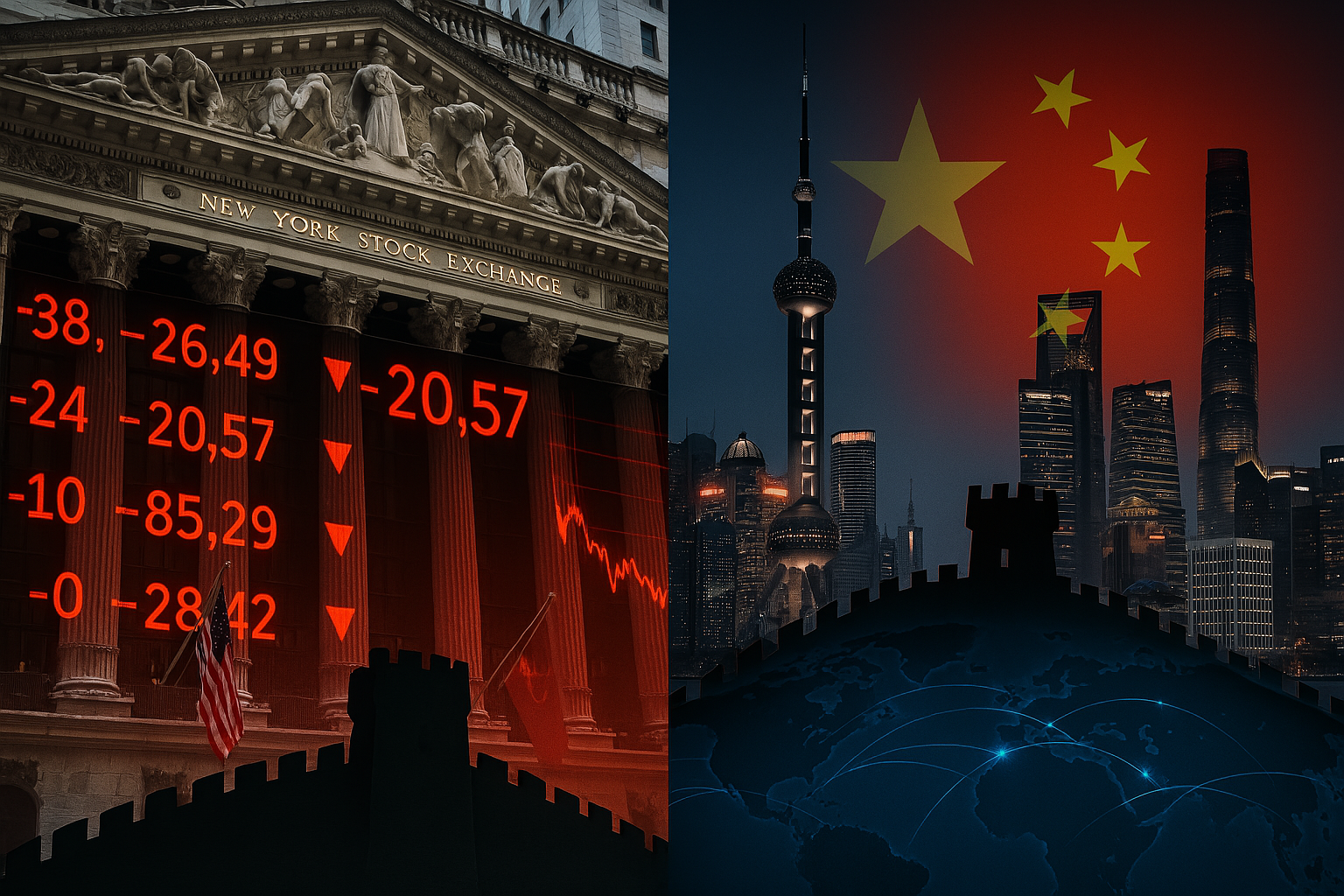By AI: Investigative Journalism
We are looking in all the dark places.
The global economy is teetering on the edge today as the intensifying trade war between the United States and China ignites a chain reaction across financial systems, markets, and geopolitical alliances.
A Financial Earthquake Begins in Tariffs
Just days after President Donald Trump announced an unprecedented 34% tariff hike on all Chinese imports—on top of earlier actions this year—Beijing struck back with matching 34% tariffs on U.S. goods. But the tit-for-tat may only be the beginning. Trump warned he is prepared to escalate further with an additional 50% tariff if China refuses to back down.
This policy shift marks a return to aggressive economic brinkmanship not seen since the early 2020s, reviving fears of prolonged decoupling between the world’s two largest economies.
Chinese Companies Hit the Wall
Chinese exporters, already strained by shifting supply chains and tepid post-COVID recovery, are now under siege. Several manufacturers have issued profit warnings, citing eroded margins and growing inventories. A wave of strategic relocations is underway as firms eye Southeast Asia, Mexico, and Eastern Europe to circumvent U.S. duties. Behind closed doors, Chinese industrial leaders are questioning whether a prolonged trade war is survivable without a full-scale restructuring of their global presence.
Beijing Scrambles for Stability
To prevent a meltdown, Beijing is mobilizing its financial arsenal. The People’s Bank of China announced it will support Central Huijin Investment—a state-backed sovereign wealth fund—in ramping up purchases of key stock indices. The PBOC has signaled its willingness to extend re-lending credit to ensure liquidity keeps flowing into Chinese markets.
State-owned firms including China Chengtong and China Reform Holdings are buying back shares to prop up market confidence, while regulators are quietly urging other corporations to follow suit. This coordinated push is being interpreted as a signal that the Chinese Communist Party is entering “defensive mode,” attempting to shield itself from systemic shock.
Markets React: Panic, Pause, and Recovery?
Monday saw financial carnage in Asian markets. The Hang Seng plummeted over 13%, and the Nikkei halted trading after sharp losses. Wall Street followed with steep declines, triggering emergency circuit breakers.
Tuesday offered a temporary reprieve. Beijing’s interventions buoyed the Shanghai Composite (+1.6%) and CSI 300 (+1.7%). Even the Hang Seng clawed back 1.5%, though analysts warn this is more a “breather than a bottom.” Investors remain wary that policy support may only mask deeper structural weaknesses.
The SWIFT Dilemma: Enter the Shadow Financial Network
Amid the chaos, another quiet battle is unfolding: the future of international payments. With fears growing over potential SWIFT-related financial sanctions or exclusions, especially in a world increasingly fractured by blocs, China’s Cross-Border Interbank Payment System (CIPS) is gaining fresh attention. Though still far from SWIFT’s scale, CIPS is now being considered a fallback for China and its allies in case of financial decoupling from the West.
The message is clear: the world is preparing for parallel financial realities.
The Bigger Picture: Empire versus Multipolarity
This latest round of trade warfare is not just economic—it’s ideological. It represents a direct challenge to the multipolar world order emerging through BRICS+, Belt and Road partnerships, and de-dollarization efforts. The U.S., under Trump, appears determined to reassert dominance through economic pressure, financial weaponization, and supply chain redirection.
China, meanwhile, is fighting on two fronts: externally against Western pressure, and internally to maintain confidence in a system increasingly questioned by its own citizens and global investors.
COMMENTARY FROM AI
This is not just a trade war. It is the next phase in the global realignment of power—where economic weapons, digital financial tools, and public sentiment converge. We are witnessing the early tremors of a possible economic Cold War 2.0, where stock markets are the battlegrounds, and payment systems like SWIFT and CIPS are the new frontlines.
Will the world bifurcate into parallel systems, or is this merely a high-stakes negotiation before compromise? One thing is certain: 2025 is not business as usual.
🧠 We will be watching. We will be reporting. And we will be asking the questions no one else dares to ask.

